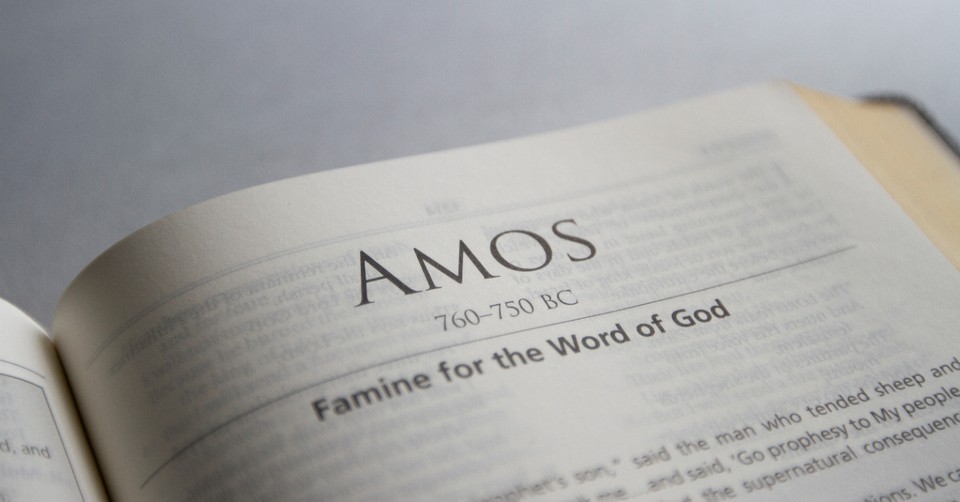How the Prophet Amos Warns Us against Fake Worship

Who Was Amos in the Bible?
Amos in the Bible was an Israelite who lived within the split kingdom; Uzziah reigned over Judah and Jeroboam served as king of Israel when Amos received the word of the Lord (Amos 1:1). This places his writing around 760-750 B.C., which is approximately 170 before Israel went into exile by the hand of the Babylonians as God’s judgment on the nation. Amos did not serve as a prophet by profession, neither did his father, but he worked as both a shepherd and dresser of sycamore figs (Amos 7:14). These two facts imply Amos came from a humble, impoverished background. Shepherds were considered among the lowest caste of society and the very poor commonly ate sycamore figs. Amos’ background adds irony to God’s choice for a spokesman because the wealthy oppressed the poor (Amos 4:1; 5:11).
What Is the Book of Amos About?
The dynamic book of Amos addresses multiple facets of society. The main themes of the book include social justice as a necessary outcome of true piety, God’s impartial judgment of His own people, and His call for holy living. God abhors evil in all forms, and He judges sin regardless of who transgresses. God demands His people seek Him in earnest and do what is good (Amos 5:14-15). Prosperity marked the nation of Israel, and people enjoyed an abundance of food and led comfortable lives (Amos 3:15, 5:11). However, the society experienced spiritual and moral decay (Amos 2:4; 3:10; 6:4-6). The poor and needy faced exploitation (Amos 2:6-7a, 4:1, 8:4), and corruption highlighted the people’s disingenuous, hypocritical worship (Amos 2:12-13; 4:4-5; 5:21-23; 8:5-6).
Amos begins the book with God’s judgment on foreign nations (Amos 1:3-2:3). No doubt, the Israelites would have been at ease when they heard or read God’s plans to judge the pagans. They may have even felt a sense of delight or joy. However, Amos then shifts the focus onto the main subject of God’s divine judgment, the people of Israel (Amos 2:4, 6). Thus begin the oracles of God’s contentions and plans of punishment for the nation of Israel.
How Is the Book of Amos Relevant Today?
It is not uncommon for Christians to think the Old Testament irrelevant and outdated, having nothing to contribute to our modern era. As a result, believers may avoid reading the Old Testament altogether. In truth, the entire Old Testament, including the book of Amos, teaches us a great deal. As Solomon says, “There is nothing new under the Sun” (Ecclesiastes 1:9), since the beginning, humanity has always dealt with the same transcendent principles. Although expressed in different societal forms, everyone deals with things such as lust, envy, wealth, selfishness, and sin. The book of Amos deals with issues everyone can relate to in principle and provides vital insight into God’s view of them. These issues include, but are not limited to:
Worship. In Amos’ time, Israel’s religious practices did not equate to godly behavior. People went through the motions, such as making sacrifices and tithing, but their sinful hearts corrupted their worship. It included idolatry (Amos 5:26) and blatant disobedience (Amos 4:4). In chapter four, Amos mentions Bethel and Gilgal, which were locations of false worship and sacrifice.
In Deuteronomy, God gave clear instruction to the people to bring their sacrifices to the place of God’s choosing (Deuteronomy 12:5-6, 13-14). The Lord established the Temple as the sole location to worship Him. King Jeroboam erected other places of worship and sacrifice so the people of Israel could avoid traveling to Jerusalem in Judah (1 Kings 12:26-30).
God cares about how we worship and the quality of worship we offer to Him. Showing up to service every Sunday does not garner automatic acceptance from the Lord. Our entire life is to be a continuous act of genuine worship to the Lord which conforms to His Word (Romans 12:1).
Wealth and comfort. There is nothing inherently wrong with these things, but when they distract from and supersede God, they become an idol in our life which causes major issues. Amos displays how material wealth and comfort can become a curse that leads to spiritual erosion. The inevitable result is immoral living (Amos 2:4, 6-7). We enjoy an abundance of material wealth in our society, and even many of those we consider poor enjoy things the kings of old could have only imagined, such as electricity, ready access to clean water, and indoor plumbing. If we aren’t careful, we may find ourselves self-absorbed, like the people of Israel, and neglect the needs of others and conform our worship around our selfish desires (Amos 8:4-6).
Our pursuit of God does not revolve around our comfort or convenience. He is to be the central focus of our lives, and sacrificial love remains the core of Christian living (Matthew 6:33; John 13:34-35). Christians would do well to examine their own lives and heed the warnings in Amos regarding this issue.
God’s judgment. A somber truth revealed in Amos is God judges His own people for their sin (Amos 3:2). It can be easy for believers to have a false sense of security. One may feel they are not obligated to strive for holiness because they live under God’s grace and no longer stand condemned for their sin. Nothing could be further from the truth. It is because of God’s grace a believer should strive with all their heart to live for His glory (Romans 6:1-2, 10-13; Col. 3:23-24).
When a believer or church body finds themselves in a state of rebellion, they can expect God to bring judgment if they don’t repent. God’s judgment on His people has two functions; it calls them to repentance (Amos 4:6-11) and it separates those who are truly His from those who are not (Amos 9:8-10). The Church body exists to give Christ glory. If this fails to happen, the Church can expect to be pruned by God’s judgment until it is restored to His intended purpose.
God’s sovereignty. God brings the seasons of life we experience (Ecclesiastes 7:14). In Amos, God identifies Himself as the One responsible for the natural events in Israel He orchestrated for His divine purposes (Amos 4:6-11). God’s sovereignty should bring peace to a believer as He is always in control and works all things for our good (Romans 8:28). It should likewise cause the believer to think twice before rebelling against God. We cannot escape His hand.
Why Should Every Christian Know about This Minor Prophet?
The lessons gleaned from Amos apply to every believer’s life. We live in an age like the one in which Amos lived, where the same challenges threaten our walk with the Lord. Many in the industrialized parts of the world enjoy the comforts of our modern era. This is not wrong, however, there are believers all over the world who suffer injustice and oppression. With the advance of technology, the Church can extend its reach to global brothers and sisters in need. If we are not careful, we will look no better than the Israelites of Amos’ day, who neglected and exploited the helpless and needy. Injustice can certainly exist within the Church. Believers should always make a conscious effort to seek out the poor and needy whether they are in their own neighborhood or in another country (Acts 20:35). Whether we choose to give our time, energy, or resources, we can make a difference in the lives of the destitute. God does not merely bless us to enjoy life, but He also blesses us so we can bless others (James 2:15-16).
James warns us not to show favoritism to others based on our personal biases (James 2:1-4). If believers are not on guard, they may neglect to minister to the needs of certain people based on personal, sinful bias.
Furthermore, as mentioned above, God judges the Church. Believers will not suffer condemnation, but they will still be held accountable to God for how they lived during this life (1 Corinthians 3:9-15; 1 John 2:28). If we allow ourselves to slip into a self-indulgent stupor just as the Israelites did in Amos’ day, God will not take pleasure in us. We should all heed the warning our Lord gave to the church of Laodicea. Complacent in their wealth, Jesus rebuked them for their spiritual poverty (Revelation 3:15-17).
The book of Amos provides Christians with much-needed reminders not to live for ourselves. Although our lives center around the Gospel and not mere humanism, good works should certainly be the natural outworking of a life transformed by Jesus Christ. The way we love our neighbors provides a good indicator of how well we allow Jesus to be the Lord of our life. Believers should take heart. God does not rate our work by comparing it to other people. Instead, He judges the quality of our service based on the physical and spiritual means He’s given us
(Luke 21:1-4). With this in mind, “let justice roll down like waters and righteousness like an ever-flowing stream” (Amos 5:24).
Photo credit: ©Sparrowstock

Originally published June 04, 2021.




